The past week in Indian politics has been of remarkable highs and lows, that signal both a shift in the winds while also being a reminder of chronic issues that persist. Interestingly, the major focal point has been the opposition playing an offensive strategy while relegating the government to a defensive position. Although this ideally should be the case as it's the opposition's role to counter government action, the BJP however has always turned the narrative to make the opposition play defensive. For instance, farmer's protests, fuel price rise, internal conflicts between Mizoram and Assam, among others are apparently, the fault not of the ruling regime but of the previous governments and the Congress. What should have been the laundry list of grievances against the current government, at the state and central levels, for the past 7 years and counting, is left to the opposition to defend.
The events of the past week, such as the strong opposition and protest against the Lakhimpur Kheri violence may be signaling towards a more offensive and aggressive opposition. This isn't a new aggressive turn but a continuation of what began with the rout of the BJP in Bengal. Post which significantly there were a slew of opposition unity meetings, the disruption of the Monsoon session over the Pegasus scandal, among other such collective offensive actions aimed at cornering the government. While one can be emboldened by this recent offensive opposition tenor, it would be too much to expect it to be a watershed moment.

While, unarguably, the Lakhimpur-Kheri violence and murders in broad daylight are a shock to the conscience of any citizen. And the suppression of any form of protest through internet shutdowns, arbitrary detentions, and inability to maintain law and order reached new lows, these are chronic issues that have only re-emerged.
Only a year ago in September, the brutal sexual assault of a Dalit girl in UP led to strong opposition protest, met with the same repressive state action. Priyanka Gandhi's emotional embrace of the victim's family in Lakhimpur can be easily juxtaposed with a similar emotive photo from her visit to Hathras last year. The series of detentions in Lucknow airport and en-route to Lakhimpur this year, can only be seen as the continuation of the detentions in Srinagar airport and arbitrary house-arrests of opposition leaders in Jammu and Kashmir in 2019. Unsurprisingly the BJP has only replicated its model in a different state, but yet the opposition has only remained playing defensive and responding passively.

While Lakhimpur Kheri dominated the headlines, the murder of civilians by terrorists in Srinagar has received limited opposition support. The failure to highlight the continuing arbitrary arrest of journalist Siddique Kapan and detention of Munawar Farooqi, barely receive any comment from the opposition. The opposition strongly protested the 2019 constitutional changes in J&K but remains relatively inactive when the valley once again sees terror.
Moreover, to confront the government on its failure to curtail terrorism, a purported aim of the removal of Article 370. The selective outrage and hesitancy to counter and corner the government at every opportunity reeks of inconsistency and noncommitment. Does the opposition find minority lives and Kashmir issues too sensitive or divisive, that it would rather ignore it than highlight it to criticize and pressurise the government? Or does it prefer to respond and react to issues that are in vogue rather than highlight and create newer narratives?
![Fact check: Lack of money wasn't reason for Bihar vendor's cremation in Srinagar [truth here]](https://data1.ibtimes.co.in/en/full/766150/fact-check-lack-money-wasnt-reason-bihar-vendors-cremation-srinagar-truth-here.jpg?h=450&l=50&t=40)
Demand for an active opposition in India
The questions and accusations on the policies and actions of the ruling regime are several, and often fall on deaf ears. Similarly, there are several questions to ask of the opposition. It's time to not ask where the opposition is, but to demand for an active and consistent opposition rather than a tokenistic and opportunistic opposition.
An essential element of democracy is contestation and competition, which the opposition fulfils by challenging the ruling regime. The wounds and injuries of the incumbent will eventually heal, but it's the duty of the opposition to remind us of these damages over and over again, since in the defeat of the incumbent, is their victory. And we the citizens of democracy deserve and demand for an opposition that enforces the checks and balances guaranteed to us constitutionally.
Mohammed Amaan Asim is a student of Ashoka University. Views expressed are author's own and do not reflect the opinions and beliefs of the website or its affiliates.

















